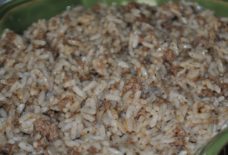Arab Women: Their Own Voices for Change
By: Ruqyah Sweidan/Arab America Contributing Writer
Arab women. Muslim women. Women of color. These groups of the female diaspora are influential, diverse, and strong. Yet, they are also often steered by outside forces. They are told that they are oppressed. Islam is holding them back. They need to be saved. If this is the case, then it should apply to all women. All women are being held back by different forces related to their distinctive environments, cultures, histories, political structures, etc. Nevertheless, they are fighting back. This article will introduce an exemplary Arab woman who is doing just that.
Who is Dr. AbiRafeh?
Dr. Lina AbiRafeh is the Executive Director of the Arab Institute for Women at the Lebanese American University, which was established in 1973. It is the first women’s institute in the Arab region. Since starting her role in 2015, Lina has introduced a strong feminist/activist orientation to the Institute. She promotes education and research to advance social and policy change. Her goal is to improve the lives of women and girls in the Arab region.
Throughout her twenty-year career, Lina has worked in development and humanitarian contexts with several international organizations and the UN.
Lina graduated with a Ph.D. from the London School of Economics, specializing in gender-based violence prevention and response. Her dissertation, “Gender and International Aid in Afghanistan: The Politics and Effects of Intervention,” was subsequently published. Throughout her twenty-year career, Lina has worked in development and humanitarian contexts with several international organizations and the UN. She continues speaking and publishing about various gender-related topics, including gender-based violence, sexual and reproductive health and rights, what’s holding Arab women back from equality, bodily integrity and autonomy, female humanitarian aid workers, and women in conflict.
Lina is an active social media user and blog writer who uses her platform to raise awareness on current issues like the humanitarian crisis in Yemen, Palestine, and feminism. Lina is also featured in the media. In the Native Society, she detailed her experiences as a feminist activist. Furthermore, she is an active member of the community as a board member of various organizations including SheDecides, Forced Migration Review, Society of Gender Professionals, and Greenpeace MENA. In 2018 and 2019, Lina was listed as one of the Gender Equality Top 100: The Most Influential People in Global Policy – one of only two Arabs to make the list.
Arab Women’s Advocacy
Lina’s writing is intricate and advocative for the situation in the Arab world. The region, unfortunately, has yet to attain full stability. Whether a country is plagued with war or a range of socio-political and economic issues, women’s rights are always the most threatened. Leaders of the region need to acknowledge that the biggest predictor of peace in a country is not economics or politics, but how the country treats its women.
Despite the political complications of Arab countries, Lina attests to the potential of the youth populations. There is a great drive toward change, and she and her network are reaching out to these people. This is pivotal in countering the setbacks being imposed upon young people by conservative governments and the patriarchal upper class.
A Global Issue
Challenges to attaining women’s rights persist in Western countries as well. Nevertheless, there continues to be a counteractive resistance in the forms of movements such as the Women’s March and MeToo. Women everywhere feel invigorated to continue forming initiatives for countless causes concerning gender equality. Gradually, the Arab region is catching on. This diverse network works hard on every project which celebrates each little victory, and women continue to be persistent in order to achieve more.
Moreover, the preceding issues have been conflated due to COVID-19. The pandemic is yet another obstacle that has pushed women’s rights farther to the back of the queue of priorities. Women, especially those living in the most unstable countries, are disproportionately more susceptible to the negative health and economic impacts of this disease. Delays in reproductive treatments, women’s health appointments, and responses to intimate partner violence have all increased. Hence, throughout this global pandemic, Lina has been a tireless advocate of the need for a feminist-focused response to COVID-19 in Arab countries.
Work to be Done
Today, young people have the power to win permanent justice and equality. The key to this victory is unwavering solidarity, courage, and dedication to the mission. Like Dr. AbiRefah, there are many Arab women making strides toward this cause every day. And you can hear from them directly at our event in March called “Empowered Women of Arab America!”
Check out Arab America’s blog here!


